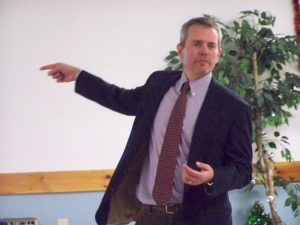MIDDLEBURY, Vt. — Outspoken Addison County residents who attended a presentation about a proposed Vermont carbon tax last week expressed their displeasure with the plan, saying it will add as much as $1,000 to their current winter heating bill if adopted.
Rob Roper, president of the Ethan Allen Institute, a free market think-tank based in Vermont, discussed the “Essex Plan” Jan. 8 at the invitation of Jon Christiano, chair of the Addison County Republican Party.

Rob Roper: “A carbon tax is not good for the economy.”
Roper is kicking off a series of community forums around the state to explain to voters the punitive nature of a carbon tax.
“A carbon tax is not good for the economy,” Roper said.
The plan, as discussed by Roper, is the latest carbon tax proposal to be bandied around in the new year.
ESSEX, a near acronym for for “Economy Strengthening Strategic Energy eXchange,” is spearheaded by Vermont climate-change activists and progressive business leaders.
“No particular organization is linked to the Essex Plan,” according to Roper. “But there are 13 authors who are linked to the climate-change movement.”
Roper cited plan authors David Mears, former Vermont Commissioner of Environmental Conservation, Jon Erikson of the Gund Institute, former Democrat State Rep. Rick Hausman, and several executives of the activist business group Vermont Businesses for Social Responsibility.
“At the close of the 2017 legislative session, legislators presented four different carbon tax bills, H.528, H.531, H.532, and H.533,” Roper said, adding that he opposes all forms of taxes and fees on carbon-based fuels.
Roper described the new carbon tax idea as the latest “zombie” plan to pop up in the Vermont Statehouse.
“The carbon tax in Vermont is really like a zombie,” Roper said. “It’s a body snatcher that will not die.”
Roper described carbon-tax advocates as going into “overdrive.”
He pointed out that activists have been stacking public forums with carbon-tax advocates and filling local papers with letters-to-the-editor and guest commentaries.
Ironically, at the close of Roper’s presentation for Addison County, a self-identified supporter of the tax, a resident of Chittenden County, identified himself to the audience and asked to hand out favorable literature on the plan. Roper said he welcomed the opposition.
While the acronym ESSEX may stand for something that sounds positive, Roper noted wryly that he likens it to the 1820 tragic wreck of the New England whaling ship Essex, which inspired Herman Melville’s classic novel, “Moby Dick”.
“The wreck of the Essex resulted in the surviving crew members cannibalizing each other,” he said.
Roper also outlined the fact that plan now being considered by many Democrats and Progressives in Montpelier would see a $240 million tax on gasoline (32 cents per gallon), heating oil and diesel fuel and natural gas and propane (24 cents per gallon).
According to Roper, the plan increases are less than those presented in an earlier Vermont Public Interest Research Group (VPIRG) carbon tax plan, which would have added over a half a billion dollars in tax. But he still thinks the plan is odious.
“Fifty percent of this Essex revenue would be used to subsidize Vermont’s electric utilities for the purpose of lowering electric rates, and the other half would be redistributed to low-income and rural Vermonters via a rebate scheme,” Roper said. “Fifty percent of the revenue would go toward low income rebates and rural rebates.”
Roper explained that electric subsidies under the plan would offer $8 million in savings for a company such as Global Foundries and lower the utility bills of ski resorts, which are electricity intensive operations.
“Sure the Ethan Allen Institute supports making it cheaper to do business in Vermont, and we want these businesses to succeed, but it’s not desirable to make it so by forcing taxpayers to cut these companies a check. This is what the Essex Plan effectively does.”
Roper is especially irked by carbon tax “doublespeak” used as means to curtail opposition.
“Here’s a good example: Bennington College student and carbon tax activist Sabrina Melendez sent around a letter to the editor.” he said. “She wrote, ‘We used to call it a carbon tax until we realized that it gave individuals the impression that they would be taxed for their carbon emissions.’ You have to laugh at that.”
Roper also noted that Vermont legislators who support the idea of a carbon tax are not going to stop promoting the idea.

Middlebury resident Thomas Sinacore: “This plan is going to add more than $1,000 to my heating oil bill. And that doesn’t even include my propane gas or gasoline costs. I am not a philanthropist; I don’t want to subsidize companies. I don’t want to pay another penny in tax. Period.”
“They like to call it revenue neutral,” Roper said. “Well, last year Rep. Johanna Donovan told a WCAX-TV reporter that ‘if indeed some of the draconian (federal budget) cuts we hear may be coming our way, these (carbon taxes) are things we could use to raise revenue.'”
During a question-and-answer session at the conclusion of Roper’s formal presentation, attendees had an opportunity to sound off, pro and con, about carbon taxes.
“Do these progressives (supporting carbon taxes) understand economics at all?” asked Douglas Tolles, a resident of New Haven. “They’re uninformed. … We can’t afford to stay here now, and then you jack up heating costs, then where do we go?”
Middlebury resident Thomas Sinacore, a retired NYPD officer, took the opportunity to express his frustration about carbon tax proposals.
“This plan is going to add more than $1,000 to my heating oil bill,” he said. “And that doesn’t even include my propane gas or gasoline costs. Hey, I am not a philanthropist. It’s not my job to subsidize companies. I don’t want to subsidize companies. I don’t want to pay another penny in tax. I am getting fed up with this.”
Lou Varricchio is a freelance reporter for True North Reports. Send him news tips at lvinvt@gmx.com.



What is so pathetic is that carbon tax DOES NOT lessen the amount of pollution, just punishes utility rate payers and business rate payers. But,hey, it makes someone “feel good” about supposedly saving the earth….
They don’t care. Vermont legislators simply do not care. This is all part of Obama’s ‘redistribution of wealth’ plan to turn America from Capitalism to a Socialist state. Vermont will carry out his legacy…whether the rest of the country follows, or not. They don’t care about your problems. They are Socialist/Communist sympathizers, led by Leahy, Welch, and Sanders. That is what they are about. Isn’t it obvious?
Lol you guys have controlled every body of the federal government for a year and you’re still blaming Obama. So I guess we can say that the good economy is just rollover from the Obama administration?
I am amazed they would bring that up on an election year. Bring it on !
Vermont Unilateral Carbon Tax an Economic Headwind:
Various RE interests and lobbyists are going around the state to promote a unilateral carbon tax to save RE businesses, because future federal subsidies will be decreasing.
The unilateral carbon tax would take $240 to $300 million out of people’s pockets and transfer it to the state government. A unilateral carbon tax would significantly increase the cost of gasoline and diesel for driving, and of fuel oil and propane for heating.
As part of various state programs, some people would get some money back as rebates, many others would get nothing back, or much less than paid in.
For Vermont to impose a unilateral carbon tax would make its economy less competitive versus other states, i.e., more brain drain, more tax-paying households leaving the state (TAX-CONSUMING families are staying), and fewer good-paying, steady, full-time jobs, with good benefits in the private sector. A unilateral carbon tax would be another headwind for the anemic, near-zero, real-growth Vermont economy.
A unilateral carbon tax would further aggrandize Vermont’s government, which is too large, too inefficient, spending too much money, is bloated with programs, and is running annual deficits, that are offset with annual increases of taxes, fees and surcharges, as if money grows on trees.
http://www.windtaskforce.org/profiles/blogs/vermont-energy-transformation-and-carbon-tax
http://www.windtaskforce.org/profiles/blogs/unilateral-regressive-carbon-taxes-a-headwid-for-the-vermont
After six long years of out-of-control spending, Vermont finally has a governor, who aims to reduce the bloated, wasteful state government to enable the anemic, hollowed-out private sector to start growing again.
A wise person would advocate putting the horse before the car, i.e., first use less energy, then build-out the much lesser capacity systems needed for the energy still being used. This is so simple. Most people get it, but most pro-carbon tax folks do not.
Pro-carbon tax folks want to have the unilateral carbon tax now, so the state government would set up various programs, and folks would have to go through various hurdles to qualify to get some of their money back; most folks would never qualify. Here is one way the money would be used.
Various subsidies would be used to finance high-efficiency duplex mobile home communities in Vermont’s Northeast Kingdom, with solar panels on the roofs and batteries on the wall, and efficient appliances and lighting, and heat pumps. It would be part of GMP’s expensive “islanding/microgrid” fantasy. Here are examples of such a state-subsidized boondoggles.
http://www.windtaskforce.org/profiles/blogs/pv-solar-sonnen-combo-low-income-housing-demonstration-project
http://www.windtaskforce.org/profiles/blogs/high-costs-of-wind-and-solar-and-solar-battery-system-combos
http://www.windtaskforce.org/profiles/blogs/subsidized-solar-systems-cause-chronic-budget-deficits-in-vermont
The low-income residents likely would:
– Have minimal or no heating and electric bills
– Pay minimal or no rent
– Get food stamps and qualify for Medicaid, and other welfare goodies
– Pay minimal or no income and school taxes
– Sing the praises of the good that befell to them in pro RE press releases
– Vote for Democrat legislators forever
Who pays for all the subsidies?
Who pays the resulting higher prices for goods and services?
Answer: Those who will pay the carbon taxes, and other taxes, surcharges and fees.
Anytime a politician says he going to extort a tax from you and “give it all back”, he means give some of it to back you, but most of it to his favorite constituents who voted for him.
Efficiency Vermont is a notoriously wasteful, quasi-government program, audited on a cozy basis, by the PUC.
EV, financed with an onerous, ever-increasing, $65 million surcharge on electric bills, is a perfect example of taxing the many and giving to the few who are “deserving”, i.e., willing to do things the expensive EV way to get some money back.
http://www.windtaskforce.org/profiles/blogs/efficiency-vermont
In the meantime, Vermont ranks 48th on business climate, per Forbes. A unilateral carbon tax, and more government-directed, socialist-style redistribution programs will make it even worse. State-directed, socialist-style economics was practiced in the USSR and Cuba. We all know how that worked out.
http://truenorthreports.com/forbes-ranks-vermont-48th-for-business-climate
Typical VT ;legislators. Expenses and taxes thru the roof. So, since the President has decided to lower taxes on most Americans, the legislators (that we pay……..) seem to think that we must take our windfall and pay it to them?? Oh, and I assume they should all get pay raises for being so good to us. More windmills, more fields devoted to solar panels, and more taxes to pay for them. According to them, in no time flat, they’ll be sending us checks from all the “free” power that we’re going to have.
If the last few weeks weather hasn’t awoken these clowns up, what will???
So the “progressives” ,via the ESSEX plan, raise the cost of gasoline in order to support the electric industry, and drive down the cost of electricty for the ski areas which use insane amounts of electricity which is mostly generated by carbon based fuels, and which attracts hundreds of thousands of flatlanders every winter driving carbon fuel burning SUV’s ………………right……….makes perfect sense.
I like the illogical circular distribution of energy there! Just ludicrious!
hmmm…one has to wonder why God put it there. Oh. I forgot. There is no god and no one put it there.